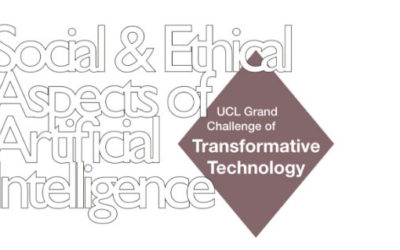Digital Ethics Forum
With the advent and development of new digital technologies – such as artificial intelligence, IoT, and blockchain – significant and historical changes are likely to occur. Indeed, analogies have been made to historical revolutions in the means of production, with the current epoch referred to as the fourth industrial revolution, and information period. The stakes could not be higher. It is paramount that these changes are through and reflected upon, and that such reflection is translated into actionable and practical consequences in the use and development of these technologies.
Digital ethics, defined as the moral, ethical, social and legal consequences and implications arising as a result of the emergence of new digital technologies, is an area of rapidly increasing research and policy activity. It is characterised by acute interdisciplinarity, bringing together specialisms in computer, information, policy, social, and engineering sciences.
The UCL Digital Ethics Forum led jointly by UCL Computer Science and UCL Department of Science, Technology, Engineering and Public Policy (STEaPP), facilitates the intra-UCL conversation around pressing ethical challenges arising from ubiquitous data collection and increasing adoption of algorithmic decision systems in every aspect of our lives.
This forum is particularly interested in complementing wider national and international debates emerging from policy and legal domains by offering new perspectives and solutions from a computer science and technology viewpoint.
UCL is in a notably strong position to convene for impact, not least due to its rich and potentially synergistic existing work across its multi-faculty, multiple departments and groups, as well as its position at the centre of London and close proximity to UK Parliament and government departments. Beyond UCL, the forum plans to work with existing partners from across central government departments.

About Digital Ethics Forum
This initiative was launched on May 1st, 2019, with the support of UCL Grand Challenges. Senior members of UCL presented:
Prof. Joanna Chataway (Head of Department STEaPP)
Thinking about ethical dimensions about technology policy has sometimes framed technology as neutral. The challenge has therefore sometimes been framed as being one of using good judgment and evidence to use technologies. When it comes to the development of policy to guide their use, similar logic has applied. STEaPP research and policy engagement aims to go beyond that logic exploring how social and physical technologies are co-created and the role that public policy plays in that co-creation.
Prof. John Shawe-Taylor (Director, Centre for Computational Statistics and Machine Learning)
AI is revealing things we think about ourselves. The intelligence of the machine may be more advanced than that of humans – so what distinguishes us from machines? We need to know this in order to think about ethics, i.e. what are we predicting and protecting by engaging in digital ethics. Indeed, life and the world at large is unfair – perhaps AI highlights this and forces us to think again about these notions
Prof. Piet Eeckhout (Dean of Laws)
There is a need for a ‘Generalist academic’, who can look more broadly at law and ethics. This is a call for Interdisciplinary: lawyers can bring this to the forum by not just looking at law as instrumental. Not just to tell you what the law it. UCL lawyers are interested in these legal ambiguities concerning AI (for example in automation and notions of equality).
Prof. Geraint Rees (Dean of Life Sciences and Pro-Vice-Provost – Artificial Intelligence)
UCL has considerable strengths; Our exceptional and broad disciplines, our commitment and competence in interdisciplinary, our strength in foundational AI and Massive Data Analysis, and we are committed to impacting. All of this suggests we can make the whole greater than the parts.
Related Papers and Publications

Algorithmic Government - The Computer Journal
Paper #02
Paper #03
Paper #03

Next GovTechLab Event
Latest News
Ethics and Digital Policy (UCL STEaPP)
In this blog, Dr Ine Steenmans and Prof Joanna Chataway, from the Department for Science, Technology, Engineering and Public Policy (UCL STEaPP), offer their initial position concerning the discussions at the first UCL Digital Ethics Forum. Dr Ine Steenmans is a...
read moreDigital Ethics Forum (Interdisciplinarity at UCL)
On May 1st, 2019, the initial meeting of the UCL Digital Ethics Forum was held. GovTech Lab’s Dr. Zeynep Engin directed this initiative, with GovTech Lab’s Prof. Philip Treleaven, Dr. Catherine Mulligan (CTO) and Dr. Emre Kazim all in attendance and participating. The...
read moreDr. Catherine Mulligan reports on her attendance at the Nordic-Baltic Security Summit (Estonia, April 2019)
I recently attended the Nordic-Baltic Security Summit in Tallinn, where I presented on two areas that I have been working on for a very long time - Data Supply Chains, blockchain and the security implications of both. I have been growing quite concerned about data...
read more



